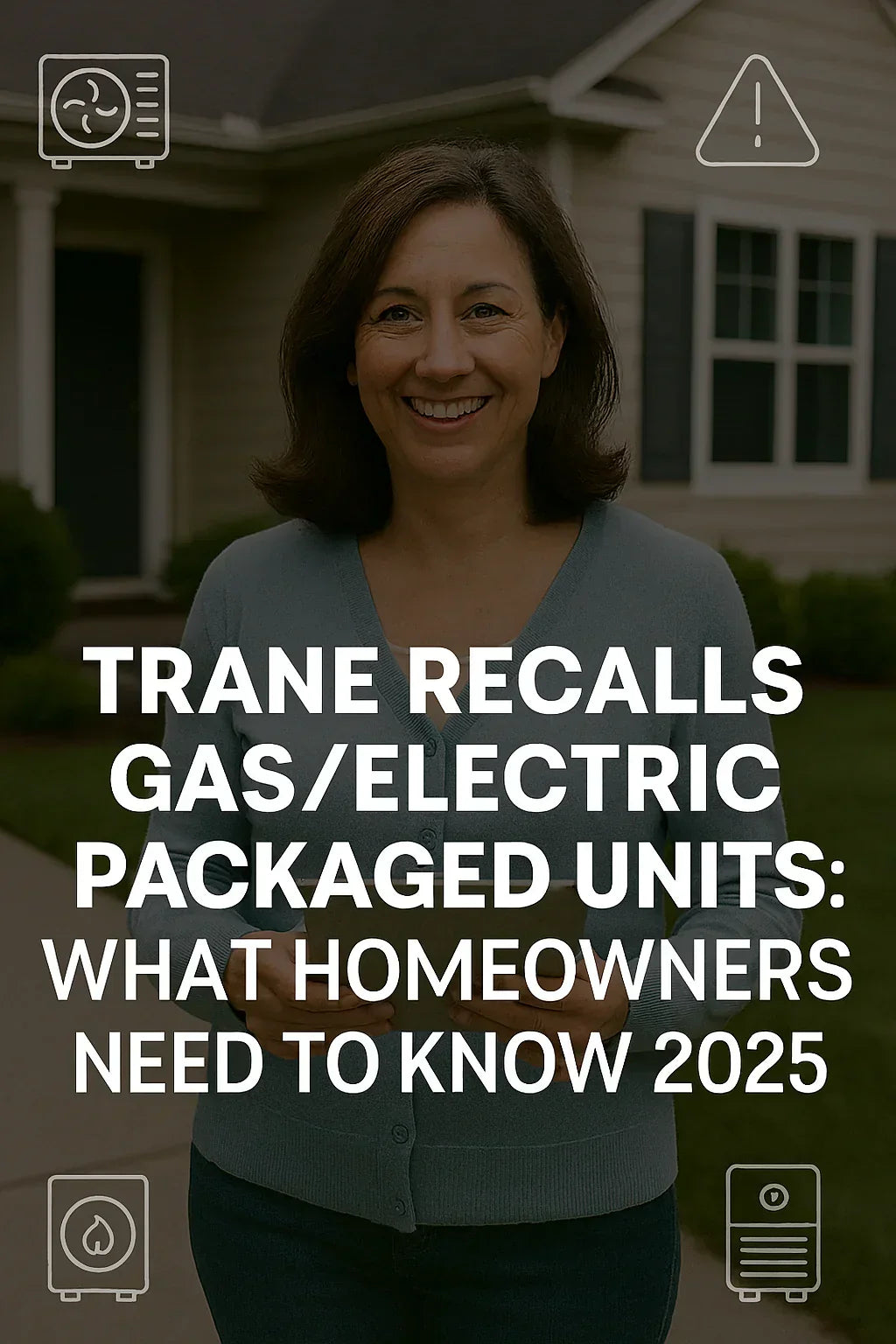🛑 Recall Alert: Trane’s Voluntary Recall on Gas/Electric Packaged Units
Trane has issued a voluntary recall on select gas/electric packaged units due to a potential fire hazard caused by a heat exchanger issue, impacting homeowners across the U.S. If you own a Trane packaged unit, understanding what this recall means for your safety, comfort, and budget is crucial.
As your trusted advisor, Samantha Reyes, I’m here to break down what this means, what steps to take, and whether it’s time to consider a safer, future-proof alternative like an R-32 Air Conditioner and Gas Heater system for residential use
🔥 Why Did Trane Issue the Recall?
According to ACHR News, the recall impacts about 50,000 units due to a risk of heat exchanger overheating and potential fire, posing significant safety hazards in residential applications.
While Trane has not reported injuries, this recall highlights the increasing need for safer, environmentally conscious alternatives for home heating and cooling.
🏠 Is Your Trane Packaged Unit Affected?
The recall impacts specific models manufactured between February 2020 and March 2023. Homeowners are urged to check their unit’s serial and model numbers against the recall list provided by Trane.
🔹 How to check:
-
Locate your unit’s nameplate (typically on the exterior panel).
-
Contact Trane or your HVAC contractor to confirm.
If your unit is affected, Trane advises stopping usage until a free repair is completed by a qualified technician.
🚨 What This Means for Your Safety and Comfort
-
Fire hazard: If left unaddressed, faulty heat exchangers can overheat and ignite nearby materials.
-
Potential carbon monoxide risks: Cracked or failing heat exchangers can allow CO to enter your home, risking health and safety.
-
Downtime: Repairs may take time, especially during peak heating or cooling seasons.
Taking prompt action will help protect your home, family, and investment.
🌿 Should You Upgrade to R-32 Packaged Units?
As refrigerant regulations shift and homeowners seek climate-forward solutions, switching to an R-32 Air Conditioner and Gas Heater packaged system offers benefits beyond addressing safety recalls:
✅ Lower Global Warming Potential (GWP): R-32 has a GWP of 675, significantly lower than R-410A’s 2088.
✅ Higher efficiency: Many R-32 systems offer higher SEER2 ratings, lowering energy bills.
✅ Future-proof: With the EPA’s phasedown of high-GWP refrigerants, R-32 positions you ahead of compliance.
✅ Safe operation: R-32 systems are designed with enhanced safety measures, protecting your family and property.
✅ Compact design: Fits most residential spaces without major modifications.
🔧 How to Transition: Steps to Replace or Upgrade
1️⃣ Verify your current system status (recall eligibility, repair timeline, performance).
2️⃣ Evaluate your household needs:
-
Home size (square footage)
-
Climate zone
-
Existing ductwork and clearance
-
Desired energy savings
3️⃣ Compare R-32 packaged systems
4️⃣ Consult with a qualified HVAC contractor to receive accurate sizing and installation guidance.
5️⃣ Plan your budget and financing using rebates, local utility incentives, and possible federal tax credits (often available for high-efficiency systems).
💡 Why Homeowners Are Moving Toward R-32
With environmental regulations tightening and the 2025 refrigerant phaseout accelerating, many homeowners are proactively replacing older systems to avoid:
-
Refrigerant cost spikes
-
Non-compliance fines
-
Decreased resale value on properties with outdated HVAC systems
R-32 systems not only reduce environmental impact but also deliver quiet operation, strong heating and cooling performance, and compatibility with smart thermostats for better comfort and energy savings.
🛠️ Maintenance Tips for Safety and Longevity
Whether you choose to repair your Trane unit under recall or upgrade to an R-32 system, follow these best practices:
✅ Annual professional inspections: Check heat exchangers, refrigerant levels, and electrical connections.
✅ Replace air filters regularly to maintain airflow and efficiency.
✅ Keep outdoor units clear of debris for proper ventilation.
✅ Monitor unusual smells or noises indicating issues.
✅ Install carbon monoxide detectors near sleeping areas for safety.
Learn more maintenance best practices for R-32 systems here.
📊 Cost Comparison: Repair vs. Upgrade
| Option | Estimated Cost | Long-Term Impact |
|---|---|---|
| Repair under recall | $0 (covered by Trane) | May extend the life of an older, less efficient system temporarily |
| Replace with R-32 system | $3,500–$7,000 (varies by tonnage and SEER2 rating) | Lower energy bills, increased safety, future-proof, potential rebates |
In many cases, investing in a modern R-32 system will pay off over time, especially if your Trane unit is out of warranty or older.
🔗 Additional Resources for Homeowners
💬 Final Thoughts from Samantha
If you own a Trane gas/electric packaged unit, take action immediately by verifying if your unit is impacted by the recall. While repairs may resolve immediate safety concerns, consider whether this is the right time to upgrade to a modern, efficient R-32 system that aligns with environmental and safety standards.
Choosing to invest in a system that will serve your home efficiently for the next 10–15 years means lower utility bills, peace of mind during extreme weather, and compliance with evolving refrigerant regulations.
For questions or guidance on transitioning to an R-32 system, feel free to reach out anytime. I am here to support you in creating a safer, energy-efficient, future-ready home.
— Samantha Reyes, Your HVAC Advisor at The Furnace Outlet
✨ Need help choosing the right R-32 system for your home?
Explore residential R-32 packaged systems now and secure your home’s comfort and safety for years to come.







